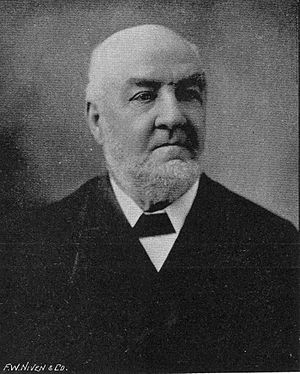days were spent by the Commission at Rottnest, and as a result of their labours the report, signed by Sir John Forrest, as chairman, caused the formation in 1886 of the Aborigines' Protection Board. A point of contention in the Constitution Act of 1890 was the decision come to by the Imperial Government to retain control over the natives of the colony and to demand that the local Government should pay according to revenue so much per annum for their support and protection. Since responsible government, local politicians have strenuously objected to paying these sums of money for purposes where they have no voice in their allocation. The Aborigines' Protection Board is still (1896) in existence under Imperial control, and Dr. Waylen is its chairman. About seven years ago a commission, with Dr. Waylen as chairman, was appointed to investigate and report on the water supplies and drainage of Perth and Fremantle; an improvement in certain sanitary arrangements and also in the water supply for each centre eventuated from its report. Horticultural and agricultural interests have, however, received special encouragement and assistance from Dr. Waylen. Throughout the course of his career he has been a redoubtable advocate for a better system of working in these industries, and he has devoted much time to developing them. He was elected president of the first general conference of horticulturists and fruitgrowers held in Perth four years ago. At the same time he was president of the Swan Vine and Fruit Growers' Association, which was the second association formed in country districts for the furtherance of vine growing. Both of these bodies gave a stimulus to the industries interested, and the results are sure to show in years to come. In 1894, Dr. Waylen was president of the Royal Agricultural Society of Western Australia, and also of the Horticultural Society.
In his profession the doctor holds first rank in the colony. He was for years president of the Board of Health as well as president of the Medical Board. He has been a governor of the Perth High School since its foundation, and was gazetted a Justice of the Peace in 1863. He was a member of the Perth Commission for the Colonial and Indian Exhibition. Dr. Waylen was first married in 1862 to a daughter of the Hon. J. W. Hardey, M.L.C. That lady dying, he married in 1887 Lady Leake, widow of the late Sir Luke S. Leake, for years Speaker of the Legislative 0ouncil.
From this short sketch it will be recognised how closely Dr. Waylen has been associated with Western Australia and how wisely he has used his position in encouraging development in local industries. He holds the most honourable of medical records in the colony, and has been able to render substantial service to his profession and the colony at large. He enjoys the respect and confidence of all West Australians, who admire his talents as a physician and surgeon, his courtesy and sense of honour as a private gentleman, his services in protecting the rights and status of the medical fraternity, and his assistance of the development of the primary industries of the soil. What Sir John Forrest has been to the colony in politics, Dr. Alfred R. Waylen has been in his particular sphere.
GEORGE GLYDE, J.P., EX-M.L.C.
THE span of human life is wide enough to bridge the history of settlement in Western Australia. It seems strange that there still survive among us men who left Great Britain in 1829 to join the bands of pioneers in this colony. Moreover, it speaks well of the geniality of our southern climes that, notwithstanding vicissitudes and hardships, these men move among us to-day, hale and hearty, evincing a healthy and paternal interest in a colony whose birth and adolescence they witnessed. They now see it taking a prominent place among the Oceanic children of the motherland, and should they live a few years more—as all hope they shall—they shall probably see it the most prosperous of any British dependency. Linked inseparably with the whole history of the colony, who is better able to judge its potentialities and requirements than these veterans?
 |
Photo by GEORGE GLYDE, J.P., EX-M.L.C. Greenham & Evans. |
Mr. George Glyde, J.P., reached Western Australia in 1830, and for about sixty years he has been identified with the commerce of the colony, As one who took part in local government he inaugurated useful institutions, and associated himself with progress and order and stability. Now in honoured old age, after having spent some of the best years of his life in making Western Australia what she is to-day, he has the approving sense of having turned his time and talents to the best account.
George Clyde is a native of Yoevil, Somersetshire, England, and was born in 1821. In November, 1829, Mr. Wm Glyde, his father, and three sisters, left England on the ship Rockingham, and sailed for Western Australia, of which scarcely anything was known. To the bulk of English people
